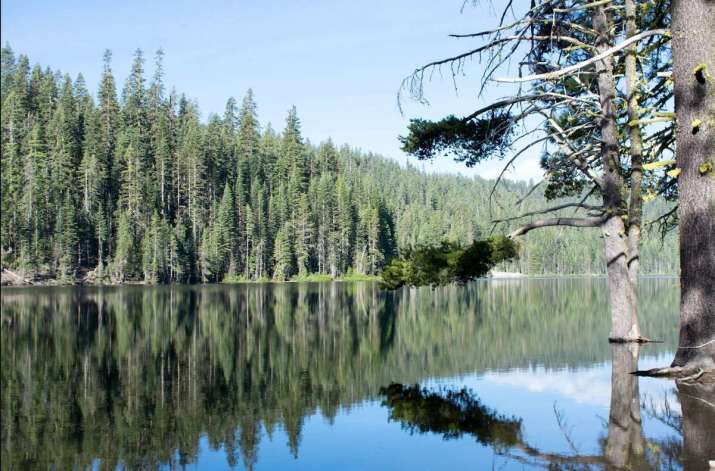FEATURES|COLUMNS|Everyday Compassion
The Sweet Sound of Silence
Many unique things happen when we remove ourselves from the hectic elements of city life. Including the blissful sound of . . . nothing. A refuge from the continual whiz of bikes and cars, the blare of music playing from a distance, the slam of construction starting in the early morning, and the buzz of aircraft overhead is hard to find in modern society.
The world’s growing population makes living conditions increasingly crowded and stillness may seem to only exist in far-off places. I find quiet at a small cabin that has been passed through my family for generations in the striking Sierra Nevada mountain range of Northern California. More than an hour outside of cell reception, the massive power of high peaks and thick forest profoundly reinvigorate my mind and body. One of the healing aspects of time spent there is how genuinely silent it is. If a car drives by blasting music, it reverberates through the emptiness and shocks the environment’s balance in its natural form.
 A lake near the author’s family cabin. Photo by Devon Fields
A lake near the author’s family cabin. Photo by Devon FieldsEven if it’s only for a few days per year, the fact that I am able to access this level of solitude is a major privilege. Humanity, especially populations living in big cities, is boxed in by the constant stimulation of noise. We have become numb to the external roars of transportation, amplification, and even celebration during festivals and holidays. Yet internally the commotion proliferates as the voice inside our head taunts us endlessly, taking what is heard audibly to an even higher level of stress. Because of this, our brains are constantly on guard and alert, the persistent noise not allowing our minds the space they need to slow down and function properly.
This is something that Buddhists know well. The Buddhist Society website quotes Aloka David Smith as saying: “In whatever tradition it comes from, the central aspiration of Dharma practice is to discover stillness and silence of mind. . . . Not easy to pull this off, but Buddhism offers the tools to cultivate this aspiration through its many practices.”*
Realizing the emptiness of all things is central to the Buddhist practice. Therefore, noise represents the fleeting distractions of want and lack, whereas silence is the base for revealing the true nature of reality.
In the Shurangama Sutra, Avalokiteshvara teaches a method called Perfect Penetration Through Hearing, which focuses on listening to silence.** This method is a way to perceive silence on its own and to find the emptiness of the distinction of sound. Through this, it is believed that the stronger the silence, the more powerful the questions that arise on the path toward enlightenment.
 Avalokiteshvara
AvalokiteshvaraBack in my daily life, I catch myself filling lapses in conversation with surface-level speak. I have been conditioned to believe that being talkative, listening to loud music, and driving a car are all signs of wellness. However, “noise pollution” has been described by several sources and studies as an ignored toxin that is hard to track.
Noise pollution was described in a 2011 World Health Organization report as a “modern plague.” The study found substantial evidence supporting the premise that the more noise we are exposed to, the more our health is put at risk. Our ears evolved in an entirely different acoustic environment than the one in which we currently live, equipped for vast expanses of open land with sensitive auditory canals to pick up and transmit sounds to identify potential sources of food or danger.
Instead, today our bodies naturally react to the stimuli of all noise, including background sounds that we may not be aware of and auditory eruptions in our sleep. Continual noise releases the stress hormone cortisol in our brains, which dictates hormonal responses and causes tension. When the body is in acute stress response, it can lead to cardiovascular and other health issues, including diabetes and depression.
Beyond the health impact on humans, sonic fluctuations are like litter in the environment, affecting plants, animals, and natural processes. Some marine mammals, including whales, are especially sensitive to noise pollution, which leads to them receiving distorted signals when locating prey and mates.
 Aerial view of Hong Kong. Photo by Simon Zhu
Aerial view of Hong Kong. Photo by Simon ZhuA popular study published in the journal Brain, Structure, and Function tested mice for the effects on the brain of listening to music. Specifically, the researchers analyzed the hippocampus, a part of the brain that regulates learning, remembering, and emotions.**** They came to the surprising conclusion that although certain types of music were found to soothe the mice as effectively as silence, as time went on only silence was found to actually create new cells in the hippocampus and literally grow the brain.
Several other scientific studies support the fact that silence heals, regenerates, and calms the mind. And although it helps, it is not necessary to have a secluded retreat far away from the business of everyday life and work; it is possible to create our own sanctuary to find silence.
Noise pollution has motivated activists from around the world to educate and encourage governments to provide better city planning and solutions to mitigate the issue from its source. One example is the use of electric cars to greatly minimize the excessive noise of transportation.
 Sunset in the Sierra Nevada mountain range. Photo by Devon Fields
Sunset in the Sierra Nevada mountain range. Photo by Devon FieldsYet plenty of sounds deserve celebration, from beautiful music to the cries of a newborn baby. To practice finding silence, one must first appreciate the noise. No matter where we are, we can lay down, look up, and appreciate the fluttering of leaves, the hum of bugs, the caw of birds, or the melody of people going about their daily lives.
Silence is serenity. It is calm. It is peace.
This process of recognizing and mentally removing tension from our environment allows for peace to be created within ourselves. Whether we lay in bed for a few extra minutes in the morning or engage in meditation, the healing powers of silence are always available.
* The Importance of Silence (The Buddhist Society)
** Listening to Silence (Tricycle)
*** Burden of disease from environmental noise - Quantification of healthy life years lost in Europe (World Health Organization)
**** Is silence golden? Effects of auditory stimuli and their absence on adult hippocampal neurogenesis (ResearchGate)
Related features from Buddhistdoor Global
How to Enjoy Life Twice as Much, Part 1: Michel de Montaigne and Rick Hanson on Life’s Natural Pleasures
Surviving the Typhoon Inside Our Mind
Embodying the Bodhi Tree
Harmonic Presence: Qualities of Silence, Listening, and Sound with David Hykes
Bringing Awareness Practice from Retreat into the World
Related news from Buddhistdoor Global
New UK Study Highlights the Benefits of Forest Bathing
Stressed Chinese Professionals Seek Solace in Sanskrit
Reindeer Yoga in Alaska: The Latest Twist in a Growing Phenomenon
Mindfulness Trials Rolled Out at Hundreds of Schools in England
Japanese Monk Promotes Cleaning as a Path to Well-being
More from Everyday Compassion by Shaelyn McHugh














